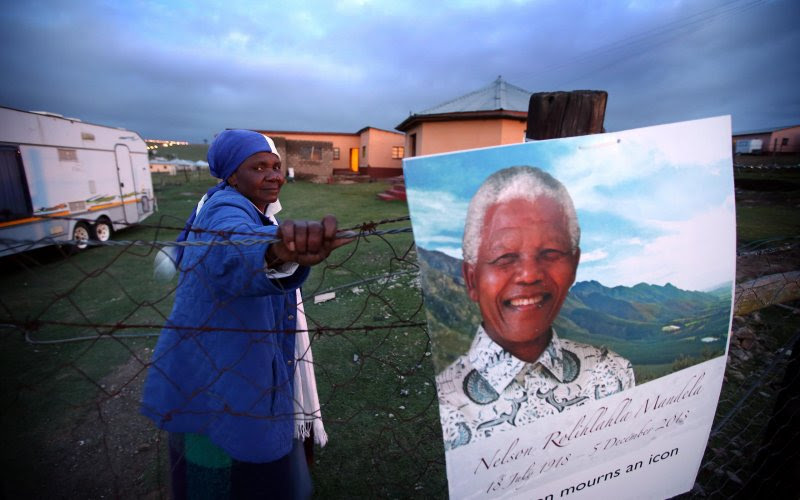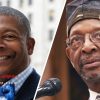
Photo by Erhan Sevenler/Anadolu Agency, via Getty
Goodbye, Madiba
The most striking political imagery of today’s funeral of Nelson Mandela might have been the sight of the South African military—once so intractably set against the freedom fighter—carrying him to his grave with such pomp and honor. But the emotional heart of the event was a eulogy by one of his oldest and closest friends, his fellow Rivonia trialist Ahmed Kathrada, in the huge white marquee on Mandela’s property at Qunu in the Eastern Cape, attended by 4,000 mourners ranging from Prince Charles and a very prominent Richard Branson to Qunu villagers.
Kathrada, who was with Mandela for 24 years on Robben Island, summarized Mandela’s legacy to South Africa neatly and modestly, without some of the exaggeration that has characterized much of this last week’s lionisation: “We are grateful that dignity has been restored to all South Africans. We are deeply grateful that the lives of thousands of people have improved and continue to improve. We are deeply grateful for a Constitution that encompasses all that is good in us. We are grateful that each and every person, white, black, coloured and Indian, can now proudly call themselves South African.”
At the end Kathrada spoke personally: “When Walter [Sisulu, another of the trialists and life prisoners] died, I lost a father and now I have lost a brother. My life is in a void and I don’t know who to turn to.” At this point, Kathrada wept, and many in the congregation did too. It was the first time I have shed a tear in this strange and complicated week, as I—like so many South Africans—have struggled to find a place to put my own strong feelings.
Earlier in the week, I tried to get to the Union Buildings in Pretoria to view Mandela’s remains. I was thwarted by the logistics of the whole thing and, like thousands of others who stood in the long snaking lines that resembled the 1994 ones which brought Mandela to power, I did not get to file past his coffin, with his grandson Mandla in attendance, according to Xhosa custom.
As I stood in line, waiting in vain to get onto a bus, uncomfortable anyway with the Stalinist implications of viewing a great leader lying in state, I laughed to myself a little bitterly that the Soviets understood the ritual of public grief better. Millions of Soviet citizens had the opportunity to trudge past Stalin’s embalmed body in Red Square, unlike the 10,000 or so who saw Mandela. But then, of course, I realized, we live in a different age, one where we do not need to experience things directly, because mass media will beam other people’s emotions into our living rooms. And as these televized mourners collapse in grief over the body of the beloved father, they stand in for our own emotions—which, to be brutally frank, might not otherwise exist.
I thought about this, again as I listened to Kathrada this morning, at the end of an epic 10 days of public mourning that has focused the world like no other funeral in living memory—except perhaps that of Princess Diana, and possibly John F Kennedy. Diana, Kennedy, Martin Luther King, Gandhi: all of those were tragedies. The tears wept were those of shock as much as grief; a reaction to brutality, and the inexplicability of mortality, at least in part. Mandela is different: the man was 95 years old, and has had absolutely no public life since a pre-recorded message he made for the 2010 World Cup, and no public impact since he attended a political rally five years ago to give his support to the controversial new ANC presidential candidate, Jacob Zuma.
Why, then, did over 90 world leaders converge on South Africa last week? Why has there been blanket coverage on all the world’s networks for days? Why have there been more obituaries by famous people in the world’s newspapers than for any other departed statesman, probably ever? Why, with the entirely expected death of a very old man, has the world shuddered, if not wept? The answer, it seems to me, must have to do with the death of the idealism that Nelson Mandela came to represent, 20 years ago, at exactly the moment that mass media became truly digital and global.
When Bill Clinton welcomed Mandela, still president, to Washington DC in 1998, he something about Mandela that I have often quoted, so acutely does it explain the man’s mythological appeal. Speaking of the universal experience of suffering and hatred as an “apartheid of the heart”, Clinton said that the world adulated Mandela because it sought “wisdom from the power of his example to do whatever we can, however we can, wherever we can, to take the apartheid out of our own and others’ hearts”.
So broad is this metaphor that it risks denying the actual man—and his actual struggle—of all his specificity, all his complexity. But it works, nonetheless, to render him—his image, his words, his unmistakable voice—a global semaphore for our best instincts; our will to do good. More potently, it presents us with an image of political leadership that is responsive, engaged, and, most of all, moral—rather than aloof, alienated and venal. Little wonder that so many of the world’s leaders, corrupt or compromised or merely banal, came to touch such a talisman. Little wonder, too, that so many of my compatriots booed Jacob Zuma last Tuesday, or are feeling the need to reassess the meaning of the South African democracy, and their relationship to it.
All week, I have been overhearing commitment ceremonies, big and small. On Thurday, on SAFM, a public radio station, Jay Naidoo was asked by his host whether anyone could ever replace Mandela. Naidoo, a former union leader who served in Mandela’s government and is now a social activist, responded that leaders of Mandela’s caliber only come along once in several generations: “We cannot sit around and wait for another Madiba,” he said. “Each and every one of us has to find the Madiba within ourselves, and act on it.”
On the same day, Wits University in Johannesburg held a memorial in its iconic Great Hall. Speaker after speaker committed himself to stemming corruption, to fighting the abuse of power, to emulating Mandela’s sincerity, to relinquishing power, as the great man did in 1999. The radio talk-shows, too, have been full of discussions about public service and selflessness, and how South African can and should do more to help their fellow citizens.
It has not stopped there. Standing in line next to me, waiting in vain to get to see Mandela’s body, two well-dressed black women began talking. They had both come alone, as had I, and as had many others in the group I spent a few hours with on Wednesday afternoon. One woman recounted conversation initiated by her teenage daughter over dinner the previous evening: she demanded that everyone at the table, including her five-year-old little brother, commit to being more considerate and caring within the family. “It’s about love,” the other woman said. “It’s all about love.”
Joyce Banda, the president of the tiny central African nation of Malawi, said something similar in her speech at this morning’s funeral ceremony, one of the day’s finest. Mandela had taught her, she said, that “leadership is about falling in love with the people you serve, and the people falling in love with you.”
Banda also directly addressed Graca Machel and Winnie Madikizela-Mandela, Mandela’s widow and his divorced wife, for the way they publicly embraced and comforted each other during the course of this week of mourning: “The love and tolerance you have demonstrated through the funeral has shown us that you too are prepared to continue with Madiba’s ideals.”
In his speech this morning, Kathrada spoke about his last visit to his old friend in hospital, witnessing the deterioration of so extraordinarily robust a man into infirmity and helplessness: “He held my hand and it was profoundly heartbreaking and it brought out all the emotions in me. My mind automatically flashed back to a picture of the man I grew up with and how I wish I’d never had to confront what I saw in the hospital. I first met him 67 years ago and I recall the tall, healthy, strong man—the boxer, the prisoner who easily wielded the pick and shovel when the rest of us couldn’t do so, the prisoner who vigorously exercised every morning.”
Several of those few thousand ordinary mourners who actually got to the coffin as it lay in state at the Union Buildings, and had a chance to peer through the glass at Mandela’s embalmed head and vividly patterned shirt, were interviewed by the media about their experiences. There was a theme to many of their responses: they were shocked at how old he was and how ill he had become; this, more than anything, seemed to have been the emotional trigger for those who could not hold back their tears.
It is clear why Kathrada felt this way: I felt similarly as I watched my own father decline towards death. There is something devastating about watching life leaving a loved one, whom we have known as vital and robust. But I have been trying to understand the public grief at the viewing of Mandela’s remains. Why is it shocking that the corpse of a very old and very ill man looks very old and very ill? Is it because we are not used to seeing corpses, and looking at a dead body reminds us of our own mortality, and the ineluctable passage of time? Is it because it reminds us of our own losses, our own fathers and mothers? Or is it because Mandela—out of the public eye for the last five years, as I have already noted—has long since ceased to be a person, and has become an icon, an idea, a value: immortal and unchanging. Seeing his real body, for those who did, brought home his materiality and—perhaps—the ephemeral nature of the values he embodies: how fragile they are, and how quickly they evaporate.
This morning at the funeral, as throughout the week, much has been made of how the man represents the nation. Kathrada spoke of how the “mass feeling”, over the past week, “shows the connection between Mandela and his people—they are the same.” Ndaba Mandela, the deceased’s grandson, said that “the story of Mandela is so much so the story of South Africa,” and Hailemariam Desalegn, the Ethiopian prime minister, expanded this northwards: “Madiba’s life was the mirror image of the [African] continent.”
One of Mandela’s greatest gifts, I wrote in the obituary which was published on The Daily Beast a week ago, was the way he set himself up to embody the nation—and then, as he saw his effect, to allow himself to be turned into a symbol for that best of human impulses: the desire to make things better. There is a double-edge to this gift, though: an anxiety about the mortality, or disintegration, of the nation, now that he has gone.
More than once this week, I have been asked by foreign journalists about South Africa’s prospects since his death. There is, of course, no way of answering this, beyond the statement that Mandela has been for the most part publicly absent for a decade already, and that, at best, his death has reaffirmed South Africans’ commitment to the values of his life.
I was asked, too, by an American journalist, about whom would assume the “mantle of Mandela.” I answered that I found the question was ahistorical: Thabo Mbeki assumed the mantle of Mandela 15 years ago, and thereafter Jacob Zuma. Nelson Mandela retired in 1999: times have moved on. It is true, that in South Africa’s current leadership vacuum, it is hard to imagine another Mandela, but such a prospect would be impossible, anyway: the man was a product of his times, and his peoples’ struggle. Only a revolutionary could assume the mantle of Mandela, and South Africa’s revolutionary times are past.
Jacob Zuma rose to the occasion, at least, with some fine lines in his eulogy, as he wondered at the “long, patient queues lining streets, some silent, some singing,” and asked himself, “what is it about this man that elicits this outpouring of sincere emotions?” Zuma reached for the following answer: “When people see goodness in a person they respond by reflecting goodness back at a person, and on their fellow men and women.”












![AEO, Ras Kass, Nkechi Taifa, Kymrence Young & Tricky Trev.) (feat. Young RJ [Slum Village], Ras Kass, Nkechi Taifa & Kymrence Young)](https://ibw21.org/wp-content/uploads/2024/12/organizing-anthem-AEO-Agitate-Educate-Organize-1600x900-1-100x100.jpg)


